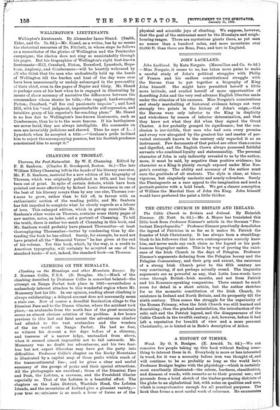CLIMBING ON THE HDIALAYA.
Climbing OA the Himalaya and other Mountain Ranges. By J. Norman Collie, F.R.S. (D. Douglas. 16s.)—Much of the climbing described by Professor Collie is somewhat belated—the attempt on Nanga Parbat took place in 1895—nevertheless a melancholy interest attaches to this wonderful region where Mr. Mummery lost his life. In our opinion, reading about climbing is always exhilarating ; a delayed account does not necessarily mean a stale one. Now of course a dreadful fascination clings to the Diamirai Pass and to the Diama Glacier, where the accident took place,—an avalanche from the north face of the great mountain seems an almost obvious solution of the problem. A few hours previous to this last and fatal ascent the adventurous climber had alluded to the vast avalanches and the wonders of the ice world on Nanga Parbat. He had no fear, as witness his descent a few days before of a chimney, and traverse of a narrow ledge, unsteadied from above, when it seemed almost impossible not to fall outwards. Mr. Mummery was no doubt too adventurous, and his two fear- less but not expert Ghoorkas may have got the party into difficulties. Professor Collie's chapter on the Rocky Mountains is illustrated by a capital map of those peaks within reach of the transcontinental line ; and he gives a clear and useful summary of the groups of peaks and their special attractions. All the photographs are excellent ; those of the Diamirai Pass and Peak, the Lofoten, a crevasse, and the Freshfield Glacier especially so. That of the Lofoten is a beautiful effect. The chapters on the Lake District, Wastdale Head, the Lofoten Islands, and the mountains of Iceland give a pleasant variety,— your true menntaineer is as much a lover of forms as of the
physical and scientific joys of climbing. We suppose, however, that the goal of the enthusiast must be the Himalaya and neigh- bouring ranges. There are mysterious giants there, as yet seen no nearer than a hundred miles, and more mountains over 20,000 ft. than there are Bens, Pens, and tors in England.






















































 Previous page
Previous page